
2/3 cups to ml How much is 2/3 cups in ml?
How many mL in a cup? Australia, New Zealand and Canada employ a metric cup of 250 millilitres. What is a cup (unit)? The cup is a cooking measurement of volume. It is traditionally equal to one-half US pint (236.6 ml), or an amount between 200 ml and 250 ml in the metric system Featured Video from Man of Many Man Of Many Hype Reel

How many mL in a cup? The complete guide
1 Cups = 236.59 Milliliters: 10 Cups = 2365.88 Milliliters: 2500 Cups = 591470.43 Milliliters: 2 Cups = 473.18 Milliliters: 20 Cups = 4731.76 Milliliters: 5000 Cups = 1182940.86 Milliliters: 3 Cups = 709.76 Milliliters: 30 Cups = 7097.65 Milliliters: 10000 Cups = 2365881.71 Milliliters: 4 Cups = 946.35 Milliliters: 40 Cups = 9463.53 Milliliters: 25000 Cups = 5914704.29 Milliliters: 5 Cups.
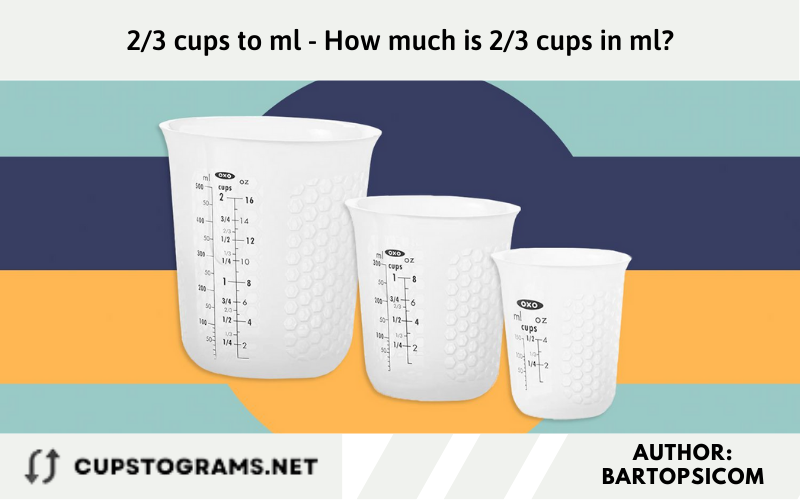
2/3 cups to ml How much is 2/3 cups in ml?
Convert 2/3 Cups to mL To get 2/3 cups in mL we have to multiply the volume in cups by the cup size in milliliters: The 2/3 cups to mL formula is [mL] = 2/3 x cup size. Thus, we obtain the following results: 2/3 US customary cups to mL = 157.73 mL 2/3 US legal cups to mL = 160 mL 2/3 Metric cups to mL = 166.67 mL 2/3 Canadian cups to mL = 151.54 mL
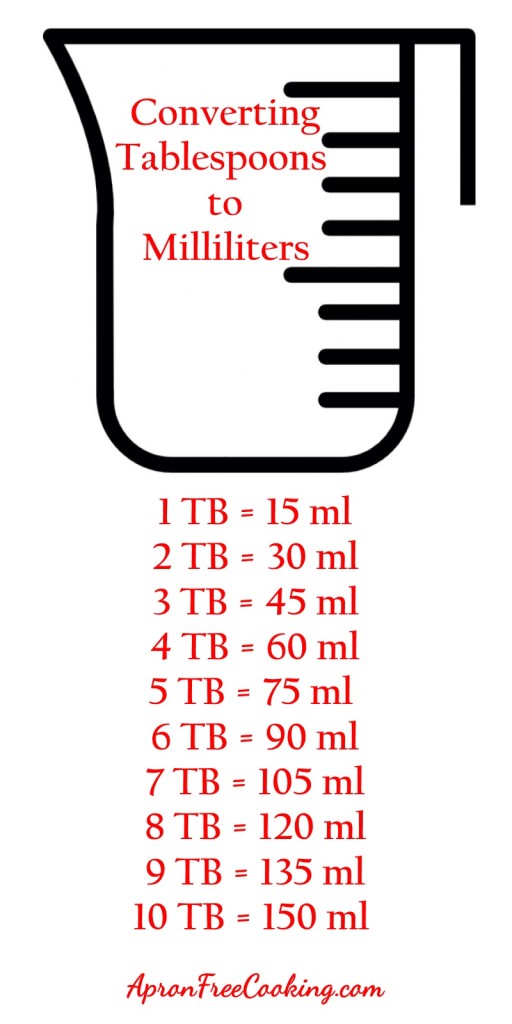
Tablespoon To Ml Conversion Bruin Blog
A 2 / 3 cup is equal to exactly 10 tablespoons and 2 teaspoons, or a 1 / 2 cup, 2 tablespoons, and 2 teaspoons. Place your dry ingredients on a kitchen scale to get precise measurements for your recipes. Measurement Conversions & Equivalents Download Article

Tablespoon Ml Conversion Chart
Convert 2 / 3 Cups to Milliliters How big is 2 ⁄ 3 cups? How many milliliters are in 2 ⁄ 3 of a U.S. cup? 2 ⁄ 3 cups to mL conversion. Amount From To Calculate swap units ↺ 2 ⁄ 3 U.S. Cups ≈ 157.72549 Milliliters result rounded Decimal places Result in Plain English 2 ⁄ 3 of a cup is equal to about 158 milliliters. Cups

How Many Tablespoons in 2/3 Cup? A Simple Guide
Cooking Techniques & Tips Measurement Conversions for Recipes Liquid Cups to mL, Celsius to Fahrenheit to Gas, and Metric Weight to Imperial By Michelle Anderson Updated on 06/24/22 Arata Photography / Getty Images In This Article U.S. Liquid Cups to mL Volume: Metric to Imperial Oven Temperatures: Celsius to Fahrenheit to Gas and Description

Cups to ml Conversion How Many Milliliters In A Cup? Converter ml to cups
Cups to Milliliters Converted In this cups to milliliters category you can find our posts explaining the conversion of a specific volume in the unit cup to the unit milliliter (ml).

Ml Conversion Chart To Cups
How to Convert Cup (US) to Milliliter 1 cup (US) = 236.5882365 mL 1 mL = 0.0042267528 cup (US) Example: convert 15 cup (US) to mL: 15 cup (US) = 15 × 236.5882365 mL = 3548.8235475 mL Popular Volume Unit Conversions liters to gallons gallons to liters ml to cups cups to ml tablespoons to cups cups to tablespoons ml to l l to ml teaspoon to ml

UK to US Recipe Conversions Cups, Teaspoon, Tablespoon, Grams, Millilitres
Task: Convert 2 US cups to milliliters (show work) Formula: US cup x 236.5882365 = mL Calculations: 2 US cup x 236.5882365 = 473.176473 mL Result: 2 US cup is equal to 473.176473 mL Conversion Table For quick reference purposes, below is a conversion table that you can use to convert from US cup to mL.

Examples Of Things That Are measured In Milliliters Measuring Stuff
Milliliter. Definition: A milliliter (symbol: mL) is a unit of volume that is accepted for use in the international system of units (SI). One milliliter is equal to 1 cubic centimeter (cm 3), 1/1,000,000 cubic meters (m 3), or 1/1000 liters.. History/Origin: The base unit of the milliliter is the liter (US spelling), spelled "litre" in SI terms. The term "litre" was originally part of the.

What Is 2/3Rd Cup ProgrammaticAGC
1 US cup is equal to 236.5882365 milliliters (mL). To convert cups to mL, multiply the cup value by 236.5882365. For example, to convert 2 cups to mL, you can use the following formula: Therefore, 2 cups equal to 473.176 mL. Using the simple formula below, you can easily convert cups to mL.
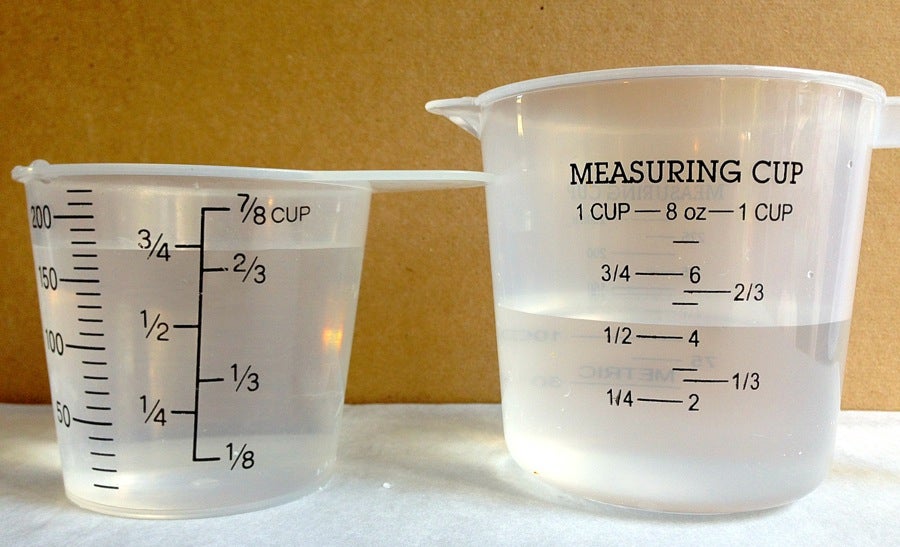
How accurate are your measuring cups? King Arthur Baking
How many milliliters in 1 cup? 1 cup equals 236.588 milliliters To convert any value in cups to milliliters, just multiply the value in cups by the conversion factor 236.5882365. So, 1 cup times 236.5882365 is equal to 236.588 milliliters. All In One Units Converter Physics ⇆ 1 cup = 236.588 milliliters

Quickly Convert Your Cups to Teaspoons to Milliliters (and More) with this Handy Chart Cooking
Cups to mL | Oz to mL | mL to Cups: Conversion Table Your handy guide - by Lottie Dalziel There's nothing worse than pulling out all of the ingredients for your favourite recipe only to realise that your measuring cup is nowhere to be seen. This guide will help you convert liquids from cups to mls. Metric Cups and Spoons
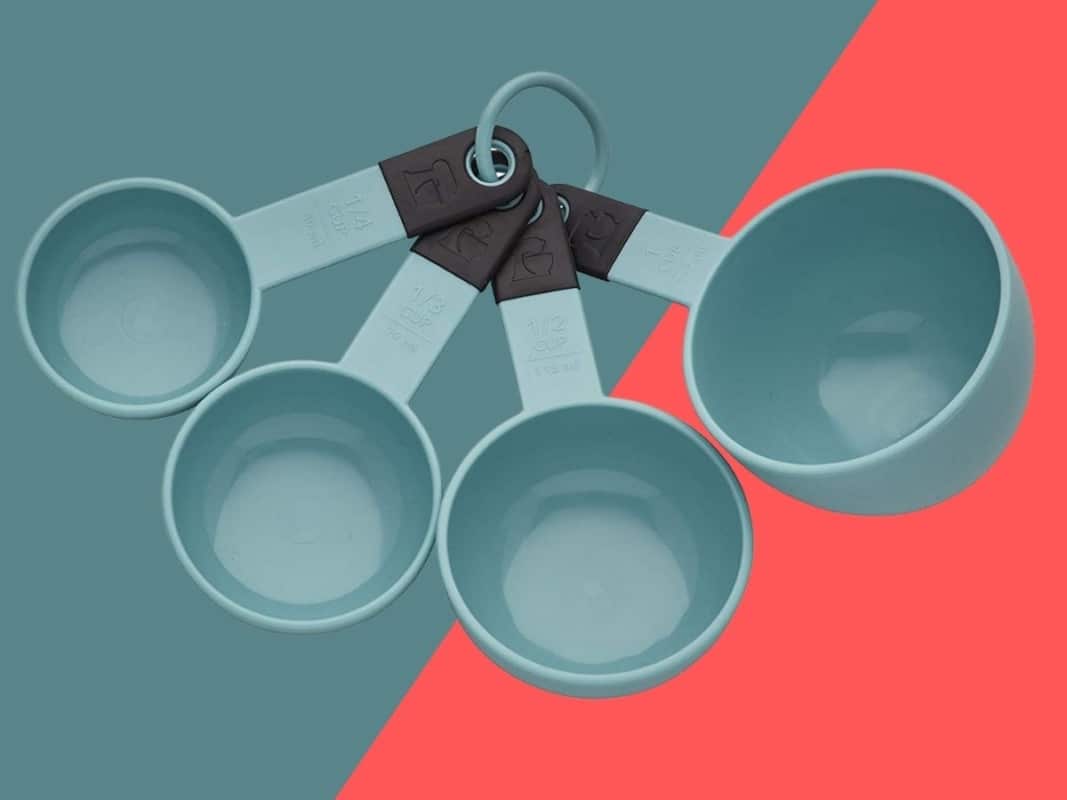
Cups to mL Simple Calculator & Conversion Table Man of Many
Cup Definition. A cup is a very commonly used unit of volume measurement, especially for measuring small volumes at the kitchen or in the garden.1 cup is the unit approved by the Imperial system and the US customary system, and it is equal to 250 milliliters. There are actually a few types of cups sued around the world, including the US legal cup, Imperial cup, Japanese cup, etc., and they all.

How Many OZ in 2/3 Cup? What is a 2/3 Cup Equal To?
Quick conversion chart of cup to ml 1 cup to ml = 236.58824 ml 2 cup to ml = 473.17648 ml 3 cup to ml = 709.76471 ml 4 cup to ml = 946.35295 ml 5 cup to ml = 1182.94119 ml 6 cup to ml = 1419.52943 ml 7 cup to ml = 1656.11766 ml 8 cup to ml = 1892.7059 ml 9 cup to ml = 2129.29414 ml 10 cup to ml = 2365.88238 ml Want other units?
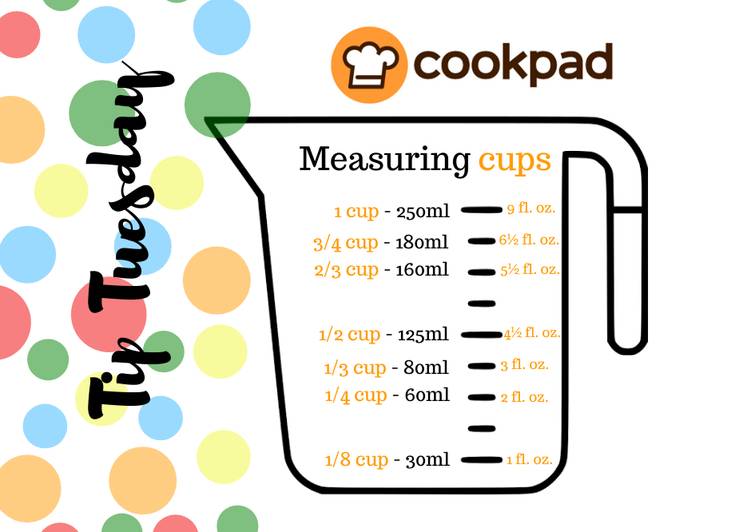
Millilitre to cup conversion Recipe by C o o k p a d South Africa 🇿🇦 Cookpad
Simply multiply 2 by 250: milliliter = 2 * 250 = 500 mL Therefore, 2 Australian cups equal to 500 milliliters. Using the simple formula below, you can easily convert Australian cups to milliliters. Australian cups to milliliters conversion formula: ml = cup * 250 How to convert mL to Australian cups?